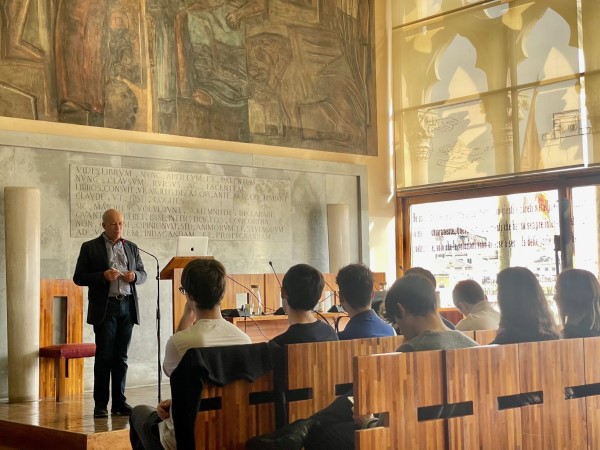In our dynamic and complex world, failure is not only inevitable but also a precious learning opportunity. But are we allowed to fail? Do we know how to take risks and accept outcomes different from the expected ones? And what is the impact of culture on how we perceive failure?
Professor Paul Iske, founder and director of the 'Institute of Brilliant Failures' (Instituut voor Briljante Mislukkingen - www.briljantemislukkingen.nl), addressed all these questions and more in his lecture "Brilliant Failure: Working, Failing, and Learning Together” hosted by Ca’ Foscari on November 9, 2023.
The lecture - organized by the Ca’ Foscari International College - was preceded by a workshop dedicated to students of Italian Superior Graduate Schools on Wednesday, November 8th. The participants had the chance to present the results of the workshop and the material they produced at the end of the event, such as a video where they analyzed their biggest failures and tried to recognize the patterns that led them there.
In his thought-provoking speech, Professor Iske challenged conventional perspectives on failure, urging people to view it not as a setback, but as an integral part of the learning process and an opportunity for growth.
Introduced by Professor Marco Li Calzi, Director of the Ca 'Foscari International College, the ‘Chief Failure Officer’ started by highlighting our general reluctance in admitting failure, stating, "We like to share only our highlights and successes, but that’s not really the whole truth. If we don’t tell the real story, with failures and mistakes, we miss out on a lot of valuable lessons. If everything goes right and according to plans, you won’t learn much during the journey”
Delving into the concept of ‘failure intelligence’, Professor Iske discussed the ability to develop pattern recognition. He shared, "We found 16 different types of patterns in failure. Recognizing these patterns helps you analyze what went wrong, learn from it and avoid making the same mistakes in the future".
The patterns or ‘archetypes’ include items such as ‘The empty chair’ (not all relevant parties were involved in the project) ‘The Junk’ (you have to know when to quit) or ‘The Canyon’ (beware of rooted patterns). All of the archetypes are available on the Institute’s website.
The lecturer also shed light on the surprises and setbacks inherent in research projects and academic life, criticizing the pressure that people are under to make false promises about their projects: “We celebrate success, great publications, perfect marks - and if you don’t have them, you’re not a good researcher or student. That’s how people become stressed and overwhelmed. But if we want to improve the academic world, you have to take risks and risks come with failures. Albert Einstein spent years of his life working on the Unified field theory, a project that ultimately failed. But he allowed himself to do it, because the idea was ambitious and it could lead to discoveries that ultimately would far outweigh the risk of failure”.
Advocating for a shift from the costs of failure to the value of failure, Professor Iske added: “There’s no improvement without experimentation and experimentation comes with failure. The more you fail, the more you learn, and the more you learn, the more the possibilities of success increase. I like to think the word 'FAIL' stands for 'First Attempt In Learning'”.
But what are Brilliant Failures? Iske defined a brilliant failure as a well-prepared attempt to create value, but with a different outcome than expected and, consequently, a learning opportunity. He outlined a ‘viral formula’ for ‘failing brilliantly’, which involves Vision, Inspiration, Risk management, Approach and Learning: “I’m not saying that the best thing you can do in life is failing, but to accept the possibility of failure, learn how to deal with it and how to survive as a human being. If lessons are learned and those learning experiences are shared, then we speak of a Brilliant Failure.”
Addressing the need for a supportive environment, Professor Iske stressed the importance of psychological safety, allowing individuals to experiment without fear of reprisal: “In this culture, people become cautious: will my project work? What will happen to me if it doesn’t? What if I lose time and money? It’s then we see many projects that should have been executed and that were not, because people are scared of failing and being held responsible. We need to create a climate of psychological safety, where people are willing and able to experiment and do research without the fear of being punished if they don’t succeed. ”
Iske also introduced the idea of a Universal human right to 'fail brilliantly':“Together with a legal team, we put together an extension of the Declaration of Human Rights. By signing this document, you acknowledge the fact that people need to feel free to start things that might fail. If you’re free to fail and share your failure, you are free to learn.”
A word from the students
Amongst those who took part in the workshop were also two students from the Ca’ Foscari International College. We asked them how the whole experience went and what was the most important thing they learned












